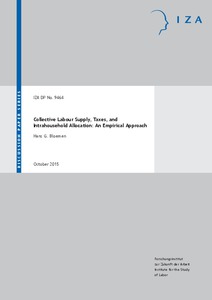Collective labour supply, taxes, and intrahousehold allocation: an empirical approach
"Most empirical studies of the impact of labour income taxation on the labour supply behaviour of households use a unitary modelling approach. In this paper we empirically analyze income taxation and the choice of working hours by combining the collective approach for household behaviour and th...
| Main Author: | |
|---|---|
| Institution: | ETUI-European Trade Union Institute |
| Format: | TEXT |
| Language: | English |
| Published: |
Bonn
2015
IZA |
| Subjects: | |
| Online Access: | https://www.labourline.org/KENTIKA-19109985124919271679-Collective-labour-supply,-taxe.htm |
| Summary: | "Most empirical studies of the impact of labour income taxation on the labour supply behaviour of households use a unitary modelling approach. In this paper we empirically analyze income taxation and the choice of working hours by combining the collective approach for household behaviour and the discrete hours choice framework with fixed costs of work. We identify the sharing rule parameters with data on working hours of both the husband and the wife within a couple. Parameter estimates are used to evaluate various model outcomes, like the wage elasticities of labour supply and the impacts of wage changes on the intrahousehold allocation of income. We also simulate the consequences of a policy change in the tax system. We find that the collective model has different empirical outcomes of income sharing than a restricted model that imposes income pooling. In particular, a specification with income pooling fails to capture asymmetries in the income sharing across spouses. These differences in outcomes have consequences for the evaluation of policy changes in the tax system and shed light on the effectiveness of certain policies." |
|---|---|
| Physical Description: | 52 p. Digital |

